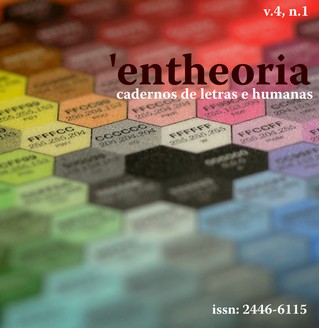Police officers of Bahia and the first movement of the 21st century cycle of demands: circulation of meanings
Keywords:
Military Police, Strike, State, MeaningsAbstract
In this paper, we analyze the process of meaning production in some Bahia’s sayings on the 2001 strike movements of police officers of Bahia (“Polícia Militar da Bahia-PM”), which happened in the second half of that year. During the cycle of demands of Bahia’s military police, the relationship between the police strikers and the government's authorities was characterized by great tension. This tension could also be observed in society as a whole and in the media. In general, the discussion reached its boiling point when it regarded whether police officers should or should not be allowed to go on strike and whether a police strike was or was not legal, legitimate. Pecheutian discourse analysis, as a praxis of historical comprehension of semantic processes, allow us to understand how such tensions take place at a language level. As a matter of fact, in such ideological disputes, the resistance act, at the discursive-ideological dimension, must take into consideration the historical subjects’ capacity to stand up against domination, setting up a social confront, which effects discursive practices.Downloads
References
ALMEIDA, J.R. Tropas em protesto: o ciclo de movimentos reivindicatórios dos policiais militares brasileiros em 1997. [2010]. V.I. Tese (Doutorado em História Social) - Faculdade de Filosofia, Letras e Ciências Humanas, Universidade de São Paulo. São Paulo: FFLCH/USP, 2010.
______. Farda, coturno e democracia: policiais militares em greve. In: MOTTA, R. P. (Org). Culturas Políticas na História: Novos Estudos. Belo Horizonte, MG: Fino Traço, 2014.
______. Identidade militar e resistência: soldados em greve. Revista Interações: Cultura e Comunidade, vol. 2, nº. 2. Uberlândia: Pontifícia Universidade Católica de Minas Gerais, 2007.
BERNARDO, J. [1991]. Economia dos Conflitos Sociais. 2 ed. São Paulo: Expressão Popular, 2009.
BORGES, C. Para governador da Bahia, PMs participaram de saques. Salvador, Jornal Folha de São Paulo: 19 de julho de 2001. Entrevista concedida a Luiz Francisco. Disponível em: <http://www1.folha.uol.com.br/folha/cotidiano/ult95u33245.shtml>. Acesso em: 02 fev. 2015.
COUTINHO. L. Pânico em Salvador: A polícia promove a anarquia nas ruas e a bandidagem aproveita enquanto o governador viaja para fazer política. [18 de julho, 2001]. Revista Veja: O Tamanho da Encrenca. Editora Abril, n. 1709, 2001. Disponível em: <http://veja.abril.com.br/acervodigital/home.aspx>. Acesso em: 10 abr. 2014.
LAGAZZI, S. O desafio de dizer não. Campinas, SP: Pontes, 1988.
RANCIÈRE, J. O Desentendimento: política e filosofia. Tradução de Ângela Leite Lopes. São Paulo: Editora 34, 1996.
ORLANDI, E. P. As formas do silêncio: no movimento dos sentidos. Campinas, SP: Editora da Unicamp, 2007.
______. Análise de discurso: princípios e procedimentos. Campinas: SP. Pontes, 2009.
______. A linguagem e seu funcionamento: as formas de discurso. Campinas, SP: Pontes, 2003.
______. Discurso e Texto: Formulação e Circulação dos Sentidos. Campinas, SP: Pontes, 2012a.
PÊCHEUX, M. Semântica e discurso: uma crítica à afirmação do óbvio. Tradução Eni P. Orlandi [et al.] Campinas: Unicamp, 2009 [1975].
______. A forma-sujeito do discurso na apropriação subjetiva dos conhecimentos científicos e da política do proletariado. In: PÊCHEUX, M. Semântica e discurso: uma crítica à afirmação do óbvio. Campinas: Unicamp, 2009 [1975].
______. Só há causa daquilo que falha ou o inverno político francês: início de uma retificação. In: PÊCHEUX, M. Semântica e discurso: uma crítica à afirmação do óbvio. Campinas: Unicamp, 2009 [1975].
Downloads
Published
How to Cite
Issue
Section
License
Copyright (c) 2017 Entheoria: Cadernos de Letras e Humanas ISSN 2446-6115

This work is licensed under a Creative Commons Attribution 4.0 International License.
O(s) Autor (es), na qualidade de titular (es) do direito de autor do ensaio ou artigo submetido à publicação, de acordo com a Lei nº. 9610/98, concorda (m) em ceder os direitos de publicação à Revista Entheoria e autoriza(m) que seja divulgado gratuitamente, sem ressarcimento dos direitos autorais, por meio do Portal de Revistas Eletrônicas da UFRPE e sites associados, para fins de leitura, impressão e/ou download pela Internet, a partir da data da aceitação do artigo pelo Conselho Editorial da Revista. É vedada a submissão integral ou parcial do manuscrito a qualquer outro periódico.


























